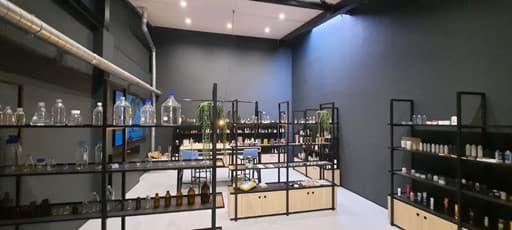
Availability

Interview with Joris de Haer, Supply Chain Manager & RP
Interviewer: Good afternoon, Joris. To get straight to the point, how do you like it at APG?
Joris de Haer: Good question to start with. I’m enjoying it very much. With a track record of nearly 20 years in supply chain management, I started at APG in December 2022. From my first days at APG, I could see that everyone is very good at what they do. APG is a great ‘people company.’ The social character of APG is a solid foundation. In general, there is a trustworthy work environment where collaboration, learning from each other, and exchanging information are natural.
The step to take APG to an even higher level, in terms of higher qualitative output, is an exciting challenge. As part of ‘one APG,’ we aim to make the golden supply chain triangle of procurement, logistics, and sales run like a well-oiled machine. My experience and knowledge gained as a capacity manager and supply chain operation manager at SC Johnson, MSD, and Activision align seamlessly with the next professionalization step at APG: Good Distribution Practice (GDP) and the OTIF principle. Success is in our hands. If we all contribute, a positive upward dynamic can emerge.
Interviewer: What is OTIF and how does APG handle it?
Joris de Haer: Meeting a delivery commitment is one of the most important, if not the most influential, aspects of our customer relationships. Our delivery performance is judged based on complete and timely deliveries. We call this OTIF, which stands for On Time and In Full. In simple terms, it means on time and complete. OTIF isn’t just a fancy logistics term. It has existed for more than 20 years in logistics and supply chain management as a quality KPI that combines storage, transport, and delivery performance. In other words, it reflects the needs and expectations of our customers. During the COVID pandemic, customers faced uncertainties in availability and lead times. Using the OTIF KPI to assess supplier reliability was a logical response.
Interviewer: Is OTIF the same as JIT?
Joris de Haer: No, they may seem similar at first, but don’t underestimate the impact of OTIF on all departments of the organization. JIT stands for Just In Time and refers to the product flow from APG to our customer. JIT originates from an inventory management strategy focused heavily on inventory costs and cost control. When we look at OTIF, we can link the first two letters, On Time, to the material flow of JIT. However, the key element of OTIF lies in the last two letters: In Full.
This doesn’t just mean sending the complete order, but also includes all the necessary quality checks, documents, certificates, drawings, batch records, and much more. And this applies to the entire process, from the customer’s request for quotation to the actual delivery and invoicing. Without timely and fully delivered packaging and related items, our customers can’t produce. This means timely delivery is just as important as complete delivery. We call this availability in the broadest sense of the word.
Interviewer: How does APG ensure a good availability policy?
Joris de Haer: Our assurance policy stems from the quality standards of our suppliers and the demands of our customers. This is the foundation of every solution we offer. We strive for optimal availability of primary packaging and effective organizational structure. This allows our customers to remain competitive and meet their social responsibilities in the pharmaceutical production of medications.
Quality standards play a major role at APG. One of the sources we can turn to is our suppliers. Our suppliers understand the stringent regulations of the pharmaceutical and cosmetics industries better than anyone. APG follows these standards to ensure reliable quality, high-quality packaging, and logistics solutions.
Interviewer: How does APG ensure that high logistical quality standards are maintained?
Joris de Haer: A specific focus of our organization is quality and continuously improving our quality. We believe it’s important to look at what’s really needed for our customers and suppliers. No matter how we approach it, one thing is certain: the customer is central to everything we do. This includes ensuring and improving the quality of documents, products, people, services, and logistical service. Feedback from our customers and reports from auditors keep us sharp and challenge us.
Interviewer: How is the warehouse involved in this?
Joris de Haer: The expansion of our warehouse is a logical step in qualitative output and APG’s strategic growth. On one hand, customers are looking for reliable logistics partners as an extension of their own warehouse. On the other hand, suppliers are looking for professional distribution channels for their pharmaceutical packaging materials. For both customers and suppliers, APG’s warehouse plays a crucial role. It ensures availability without compromising the intrinsic quality of the product, and it does so at the highest possible logistical service level. To sum it up in one sentence: from wholesaler to supply chain consultancy for the storage of primary packaging and APIs under GDP conditions.
That’s involvement at the highest level!
Interviewer: How does APG view GDP for wholesale organizations?
Joris de Haer: We’ve been operating within the scope of GDP for years, and we are preparing to be audited to ensure that APG complies with the GDP guidelines. The goal is to be GDP certified by 2024. In the coming decades, working according to GDP will become a necessity in the primary packaging market. And I’m not talking about GDP as a wish but as a requirement.
A GDP-certified APG can take a unique position as a supply chain partner. I don’t see another distributor in Western Europe quickly matching what we are doing. I am convinced that, thanks to our state-of-the-art distribution center and building complex, we can guarantee and leverage our GDP accreditation into deep logistical partnerships with our customers and suppliers.
In a world where the supply chain is crucial to the well-being of millions, APG plays a key role. Have you ever wondered how companies like APG cope with challenges in the logistics sector, especially during unpredictable times like the COVID pandemic? Joris de Haer, a supply chain professional with 20 years of experience, shares unique insights and reveals how APG strives for excellence, utilizing principles like OTIF.
Read on and dive deep into the world of supply chain management, where quality, reliability, and innovation come together.








